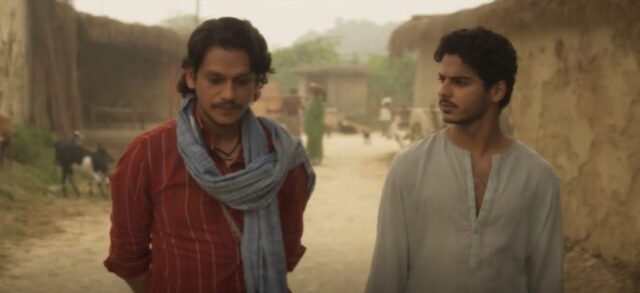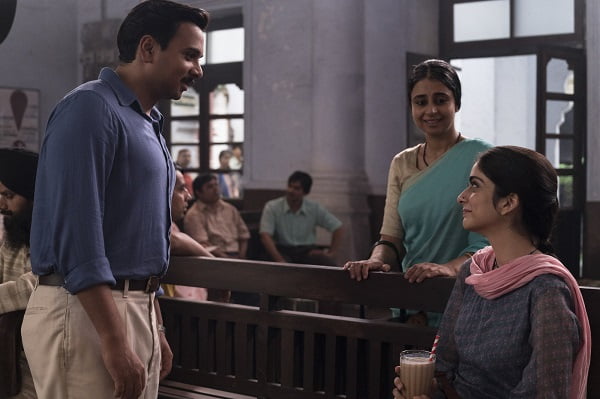Released on the 23rd of October, A Suitable Boy, an adaptation of Andrew Davies’s from Vikram Seth’s novel, is a Netflix series directed by Mira Nair. The show has quite a star-studded cast playing the roles of characters set in the post-independence background.
The story sheds light on the rather problematic ways in which people used to function right after the partition – politically and socially.
Different sections of the society have been portrayed here, each one with a set of prejudices that limit their imaginations until some outsider finally shatters them into pieces.
The story is set in the post-British period when the society was divided into two extreme categories – one which still continued walking in the footsteps left by the colonial rulers and the other which was more engaged in making this country free of all its corrupt practices.
With actors like Tabu, Ishaan Khattar, Tanya Maniktala, Ram Kapoor, Rasika Dugal and the like in the leads, there is no doubt that the performances were quite power-packed and hence an absolute treat to watch.
However, if we talk about the plot unfolding, there are a few hiccups – the main one being an overload of issues being addressed at the same time.
Communal Harmony
A part of the plot revolves around the political scenario where Ram Kapoor, playing the role of India’s Revenue Minister, pushes for the zamindari bill.
His friendship with the Nawab of Baitar as well as the one which their sons share despite the differences in their religious faiths is portrayed quite beautifully. This, along with Maan’s socially inappropriate relationship with the Saeeda Bai, a court singer, reflected that love and friendship weren’t bonds based on social institutions.
On the contrary, Kabir and Lata’s relationship paired with the constant communal outbursts among the masses helped set the background amidst which the prior mentioned relationships had developed.
The country was torn apart by the communal differences, which were being fueled further by politicians, who were only concerned with their own well-being. Under such circumstances, the purity of Firoz and Maan’s friendship did stand out well.
However, characters like Tasneem and Rasheed who seemed to have quite an important role to play in the lives of the protagonists weren’t given enough screen space. Their stories abruptly ended, just like they had been introduced in the plot.

Even the notorious Raja Sahab for that matter didn’t seem to have too much of a role after the initial few episodes.
Also Read: ED Times Exclusive With Scam 1992 Leads: “I Had To Gain 18 Kgs To Get As Close As I Can To His Body Frame”
Too Many Subplots
As the name suggests, the story does revolve around Lata finding her way to her suitable boy, showing her journey from a determined girl with a zeal to succeed and stand up for herself against the societal pressures of marrying a boy that her mother chooses for her to one that gets confused with too many suitors and gives in to her mother’s choice.

Each woman in the show has a unique story to tell – one that reveals the various norms of the society that have restricted them from expressing their identities to the fullest sense. However, except Lata, none of their stories are explored to such depths.
Serious issues like extra-marital affair, an interfaith affair with an older court singer, the relationship between the siblings on both the sides, the mothers and the way they have been sacrificing everything to be there for the family and the like – these have all been touched upon very lightly, none of them having a conclusive end.
After all, a serious show of this sort, with an extremely heavy socio-political plot, cannot do justice in just 6 episodes. It’s true that compact shows do make for a better watch. However, this can’t be achieved at the cost of the plot and the curiosity of the audience.
It would indeed have been a show with great potential, if only it were more thorough and in-depth. The highly sensitive topics it deals with do deserve more attention individually, instead of a concoction all adding up to only one protagonist having completed her journey of character development.
Image Credits: Google Images
Sources: The Guardian, NDTV + More
Find The Blogger: @Sriya54171873
This Post Is Tagged Under: A Suitable Boy, Vikram Seth, Andrew Davies, Mira Nair, communal harmony, post-independence, social institutions, Lata, Maan, Firoz, Saeeda Bai, Tasneem, Rasheed, Zamindari bill, too many subplots, social issues, Tabu, Ishaan Khattar, Ram Kapoor, Rasika Dugal, Tanya Maniktala
Other Recommendations:
In Pics: Karnataka High Court’s Tide Changing Comments On The Gang Rape Case
































